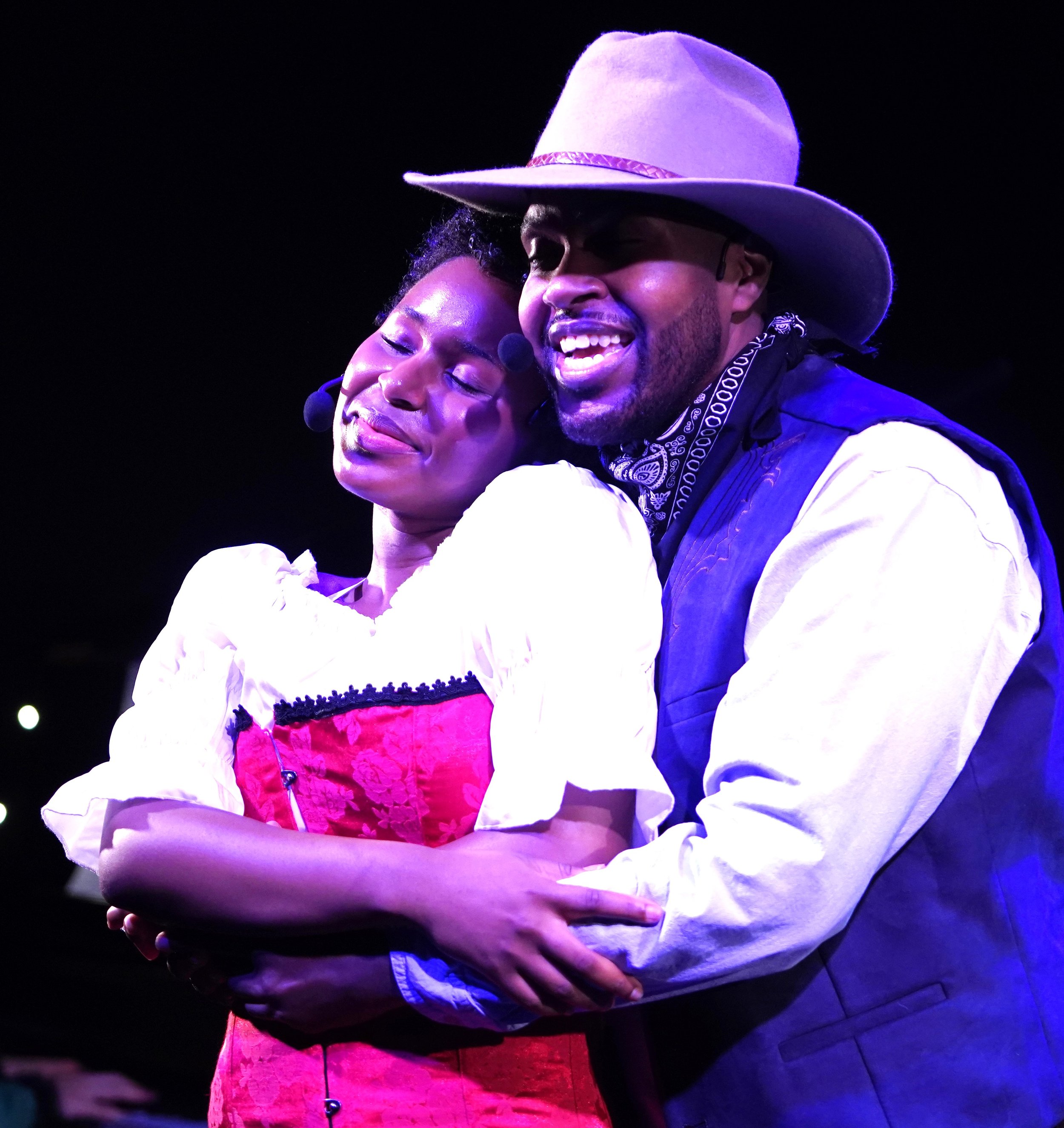Taylor Elise Jackson and Jeffery Lewis in Cross That River at 59E59 Theaters.
Fact marries fiction in the new musical Cross That River, a tale about a runaway named Blue who escapes slavery in the 1860s to become one of America’s first black cowboys. Soulfully directed by Reggie Life, and starring jazz musician Allan Harris, Cross That River has music and lyrics by Harris, and a book written by Harris and his wife, Pat Harris. Although its musical patterns are mostly defined by a spirited jazz and blues vibe, there are also dashes of gospel, country and western, and African rhythms that pulsate in the vibrant songs.
Allan Harris performs as both the Narrator and Blue in old age, and Taylor Elise Jackson is Annie Hutchinson.
Harris slips into the persona of the Narrator and the older Blue effortlessly. He doesn’t try to flaunt his range or grandstand on stage. He simply humanizes his text with his velvety baritone voice and lets his yarn-spinning work its theatrical magic.
After his mother is sold by their owner, Blue is raised on a plantation in Louisiana by his aunt, “Mama Lila (Taylor Elise Jackson), a shrewd and generous-hearted slave who was both surrogate mother and muse to Blue. Blue has a proclivity for working with horses, which gives him special privileges. But when his secret affair with McLaughlin’s daughter Courtney (Brooke Sterling) is discovered by Mama Lila, she fears for Blue’s life and advises him to escape to freedom across the Sabine River to Texas. Courtney provides Blue with a horse, and Blue leaves his sweetheart to find freedom in the unsettled West. In the song “Blue was Angry,” he expresses his rage over the racism that has torn him away from his loved ones:
Guitarist Allan Harris is the composer, lyricist, and cowriter of the musical Cross That River.
Blue.
I was dark as molasses,
Had hair like a buffalo
Ran away from Louisiana
Where I watched my folks get sold
I was angry
Oh yeah, I was scared
So I stole the master’s stud horse
And rode into the West.
If that song reveals the fractured family life of Blue, an Act I ballad, “Circle T,” captures the grueling life of a cowboy as learned from the seasoned cowhands and Mexican vaqueros. Whether it was roping, branding, or staying in the saddle from sunup to sundown, cowboys led a tough and gritty life. As the song “Circle T” succinctly sums it: “Hurry up sign up / Rope a horse and climb up/ Ya working for the Circle T. “
Blue eventually would become the “top hand” at the fictitious Circle T and would meet all kinds of folks who had different creeds and philosophies. There was the cantankerous cook, Mule Skinner (Norman Edwards, Jr.), whose sweetheart had been raped and killed by outlaws, and the Preacher (Edwards, Jr. again) who brought the gospel to the Great Plains, baptizing, marrying, and burying the faithful in the untamed Old West.
When it comes to rousing musical numbers, “Welcome to Diamond Jim’s”` at the top of Act II wins, hands down, as a colorful taste of saloon life and the creatures who made it hum. Blue takes a shine to one of its denizens, Annie Hutchinson, who had escaped the living hell of being a Kansas mail-order bride and smartly found herself a barmaid job at Diamond Jim’s saloon. As fate would have it, Annie becomes Blue’s second—and short-lived—love. For when they marry and Annie becomes pregnant with their firstborn, and the time comes to deliver the baby, no white doctor would ride out to their homestead to help deliver their child. Ttragically, both Annie and the baby die.
Taylor Elise Jackson stars in the new musical Cross That River, directed by Regge Life, at 59E59 Theaters. Photographs by Carol Rosegg.
Harris, who plays the guitar in this show, is supported by six excellent musicians onstage: the music director Arcoiris Sandoval (piano), Norman Edwards, Jr. (drums, percussion), Paul Beaudry (bass), Alan Grubner (violin), Alicyn Yaffee (guitar), and Justin Poindexter (guitar).
Looking beyond Harris, the cast includes the mellifluous Jeffery Lewis as Young Blue, the feisty Jackson playing both Mama Lila and Annie Hutchinson, and the dewy-faced Sterling as Courtney and Constance.
The musical has its flaws. The Harrises’ book digresses at times from its storyline about the first American black cowboys by referring to the buffalo soldiers of the Ninth and Tenth Calvary regiments of the United States Army. Those troops were composed primarily of African American soldiers and were well-known for their fierceness. But instead of adding texture to the musical, it distracts one from its key focus: the black American cowboy.
But, quibbling aside, this latest iteration of Cross That River is truly a showcase for Harris’s remarkable talent and a tribute to the black American cowboys of the Old West.
The 59E59 Theaters and Love Productions Records production of Cross That River runs through Oct. 8 at 59E59 Theaters (59 E. 59 St.). Evening performances are 7:15 p.m. Tuesday through Saturday; matinees are at 2:15 p.m. Saturday and Sunday. For tickets and more information, visit 59e59.org.
Book: Allan & Pat Harris
Music & Lyrics: Allan Harris
Direction: Reggie Life
Choreography: William Soleau
Costume Design: Shirlee Idzakovich
Lighting Design: Michael Giannitti
Sound Design: Jade Elliot
Projection Design: Joey Moro






